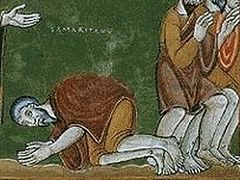In the name of the Father and of the Son and of the Holy Spirit.
In today’s Gospel reading, we learn about ten men who were lepers and whom Christ healed, and only one of them returned and with a loud voice glorified God, and fell down on his feet at His feet, giving thanks. And he was a Samaritan. So Jesus answered and said, “Were there not ten cleansed? But where are the nine? Were there not any found who returned to give glory to God except this foreigner? And He said to him, “Arise, go your way. Your faith has made you well.” (Luke 17: 15-19)
So today’s Gospel reading tells us about God’s mercy to a man, about God’s care, and it tells us how the man responds to the mercy of God.
The mercy God shows to us brings gratitude to the heart; but if this mercy remains unnoticed, we shall remain cold-hearted and indifferent towards it.
The feeling of gratitude is commingled with living faith in God, with our wholly submitting ourselves to His will, and is a fruit of it (that is the reason why Christ said to the healed man, “Your faith has made you well.”) Hence, only the heart that strengthens its faith in God’s providence is capable of seeing the mercy embracing us.
The ability to notice Divine Providence in everything happening to us—either large or small, from important events to insignificant encounters—is based on the absolute, true belief that everything in our life is by the will of God. And therefore, God is always with us. “Everything that we have, everything happening to us is of God, and it happens to us by His will... Nothing can interfere with the Divine plans against His will.”
God surrounds us with His mercy at every step of our life
Saints constantly remind us that God surrounds us with His mercy at every step of our life; we get more of His mercy than we breathe, and even a moment is more than a distance from one act of the Divine mercy to another.
The ability to see God’s mercy changes, transfigures, and softens the human heart, “If a soul contemplates the works of love shown by God, these thoughts inspire it to soar to the sky; if the soul contemplates the multitude of sins and the abundance of God’s love, then—seeing God’s care—it feels and experiences the providence of God... And gratitude permeates the soul.”
“We may feel we are in irredeemable debt to God, while God gives us His blessings, one exceeding the other.” “The better we get to know ourselves, the better we feel our absolute weakness. We perceive our unworthiness and ungratefulness and, at the same time, we perceive how great God’s love is.”
Seeing our misery and frailties, we come to realize the abundance of God’s love and acquire the feeling of thanksgiving. A grateful person is always happy, like a poor man who takes any alms and is pleased to receive them, he is happy about a smallest work of God’s love.” And thanksgiving is our acknowledgement of God’s mercy of which we are not worthy.”
Then it dawns on us, “Even if we could live for a thousand years, if we had a thousand hearts, it wouldn’t be enough to give back to Christ for His great love (and mercy) He has shown to us and continues to—forgiving our sins, being patient with us and cleansing us with His Divine Blood.”
“And so many people there are nowadays who seem to have fallen into the abyss of sin and who are, anyway, given a redemptive incentive by God to revive their soul... They get this incentive and then should realize the miracle of God’s love transfiguring their life; and at the same time, they should be endlessly grateful to God and have faith in His power and mercy in the future.”
After confession, a person should realize that God has shown mercy to him. We should feel as if we were a man whose debt has been forgiven and who owes his benefactor. Give glory to God, if you don’t want to lose the will and commit the same sins.”
We do not even pay attention to a great deal of troubles as they pass unnoticed. However, looking back, we cannot but see that there was an unresolvable problem at some moment of our life, and then there was another one, and they all passed, and no one can explain how. Similar acts of God’s mercy—very personal to everyone—are multitudinous in our life.
In everything give thanks, says the apostle, for this is God’s will for you in Christ Jesus (1 Thessalonians 5:18).
The Church has myriads of prayers, outpouring gratitude to God for all the love He surrounds us with. And what are the works of this love?
Seeing the support of God, Who didn’t leave him at the time of troubles, the righteous King David, gives glory to the Lord for He heard him, And delivered him from all his fears (Psalms 33:5), for He keeps our soul among the living (65:9), for He remembered us in our lowly state, for His mercy endures forever (135:23), for He forgives all our iniquities, heals all our diseases, redeems our life from destruction, crowns us with loving kindness and tender mercies (102:3-4), for He gives food to all flesh (135:25), for He gives food to the hungry and gives freedom to the prisoners (145:7), for He watches over the stranger; He relieves the fatherless and widow (145:9), for He opens the eyes of the blind, raises those who are bowed down (145:8).
Saint Tikhon of Zadonsk gives glory to God for He “created me in His image and in His likeness; resurrected me, a fallen man; took care of me, unworthy; called me, who sinned, to repentance; didn’t punish me for my trespasses, but out of His mercy was patient with me; supported and helped me in my numerous temptations, troubles and misfortunes; saved me in various moments of distress or death, comforted me, succumbing to despondency and despair; gave me whom am unworthy, food which strengthened my feeble body; provided me with clothes and shelter, where I could find rest and peace.”
Righteous John of Kronstadt also praises the Lord in his own prayers, for God created us, and let us be borne in the Orthodox faith; for the Holy Theotokos, Who is our intercessor; for saints, praying for us; for a guardian angel; for the Church service, which maintains our faith and virtue; for the Holy Scriptures, the sacraments and, especially, for the Blood and Body of Christ; for miraculous consolations, for hope to inherit His Kingdom and receive all the gifts He granted to us; for He many times rescued us from the abyss of sin.
In the Akathist hymn Glory to God for All Things we glorify God for generous gifts of His providence He has shown to us (Ikos 1), for showing us the beauty of the universe (Ikos 1), for loving us with love so deep, divine and infinite (Ikos 12), for the mercies, seen and unseen (Ikos 1), for ceaselessly watching over us (Ikos 5), for every condition His providence has put us in (Ikos 10), for every step of our life’s journey, for every moment of glory (Ikos 1), for sending us failure and misfortune that we may understand the sorrows of others (Ikos 9), for the love of parents, for the faithfulness of friends (Ikos 5), for sleep’s repose that restores us (Ikos 4), for the new life each day brings (Ikos 2), for what He revealed to us in His mercy, for what He has hidden from us in His wisdom (Ikos 7).
St. Paisios the Athonite turns to God, “My Lord, I thank You with all my heart for all Your gifts, I thank You for forgiving all my sins and ingratitude of the whole world, and my own deep ingratitude.”
The saints inspire us to “learn to thank God for all things and have loving (caring) heart.”
Ingratitude fills the heart if one “doesn’t know what mercy is, or considers oneself worthy of it, or claims his rights to it”.
“An ungrateful person is capable of loving only oneself, and in this feeling one is locked and blind.”
While experiencing miseries we sometimes do not see God’s providence, we can only see that our life is not settled yet. But the saints knew that similar situations are manifestations of Divine Providence, and therefore, a reason for gratitude.
Archimandrite John (Krestiankin) wrote to one of his spiritual children, “Why are you so concerned by the uncertainty of your life? I believe that everything in your life is quite logical and goes at its slow pace; one thing follows the other, subsequently and providentially. You should thank the Lord for giving you strength and time until everything around you (I mean everything that seems unsettled), in you and in your relatives, can mature. And then the fruit will ripen at the right time.”
In another letter father John writes, “You have an infirmity indeed, which is the cause for you panicky attitude towards life. And this infirmity is a lack of true faith in God’s providence and consigning yourself, everything and everyone to His will... Moreover, all of this (your state of panic) is because you forget God’s mercy and don’t give praise for everything... We shall never be satisfied, it will never be enough; we fear that a mere particle of dust can darken our life, any unspoken sorrow or meagre failure that may seem irritating.”
Turning to another of his spiritual children, Archimandrite John says, “You haven’t become worse than you were before. Circumstances of life reveal us to ourselves, removing a layer of self-delusion. Glory to God for it! It is very difficult to see our own selves, but it is necessary for salvation. This revelation bears self-reproach and humility—not false or theatrical, but one of God. Give praise to the Lord for this experience.”
“A person may seem meek, humble, generous, simple, pure and believing, until they succumb to a temptation; challenges often reveal that they are evil, proud, vicious, malicious and pleasure-loving.”
One of the saints wrote, “When bedridden, glorify God... Thanksgiving eases the intensity of pain. Moreover, thanksgiving brings spiritual comfort to the ill person! The power of living faith transforms the heart filled with and cherishing gratitude. Therefore, illness and pain are often a source of knowledge of God and self-knowledge... Once the soul tastes the sweetness of peace brought by praise, it starts to run to this peace as to shelter; the soul trys to escape waves of murmuring, cowardice, and sorrow.”
A person grateful to God is grateful to people around him even for the most insignificant act of generosity
A person grateful to God is grateful to people around as well, “even for the most insignificant act of generosity.”
By the way, in doing good for someone, one always forgets it and remembers even the minor good done them. One can never forget even the merest act of mercy.” St. Paisios gives the following example: A person of this kind “may have given someone a vineyard and forgotten about it; but he will never forget the bunch of grapes someone has given him.” On the other hand, a man may have given someone a multitude of various wooden icons and forgotten it; but if someone presents him a tiny plastic icon, despite the icon’s low price he feels pure joy. Full of gratitude, he will be thinking how to return the favor. Such a person can build a new church, give his money for the building and simply forget about it. Hence, the right spiritual approach is as follows: Remember any act of generosity done to you (even if it’s very insignificant).”
“If someone ignores the good someone has done them and, on the contrary, remembers the good they have done the others, this is the opposite of what Christ wants from us.”
Therefore, we should be grateful to everyone, and the person who is grateful to people is also grateful to God. Gratitude is characteristic of a humble and faithful soul.
God loves those who are grateful. If a person can see and values the mercy of God, they always feel and receive this mercy.
Amen.




